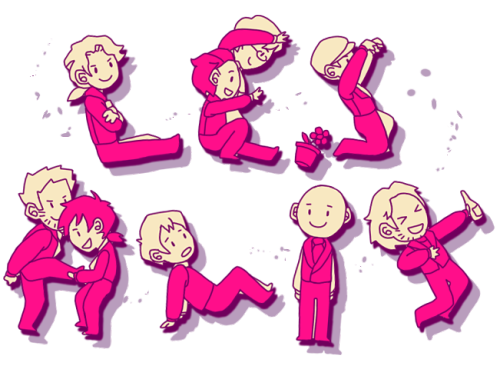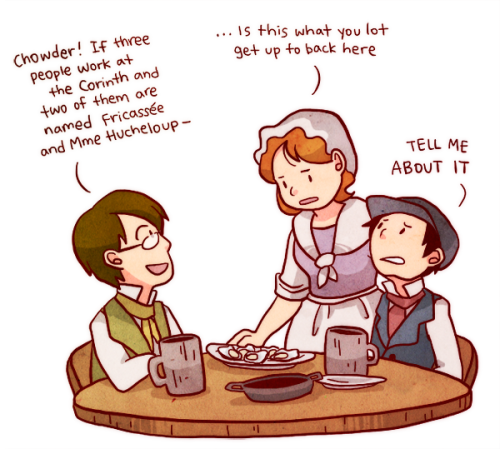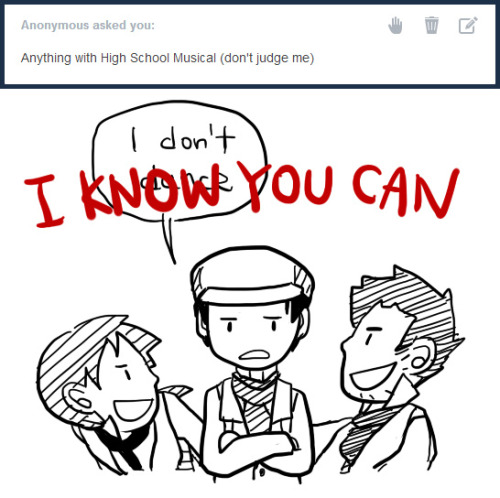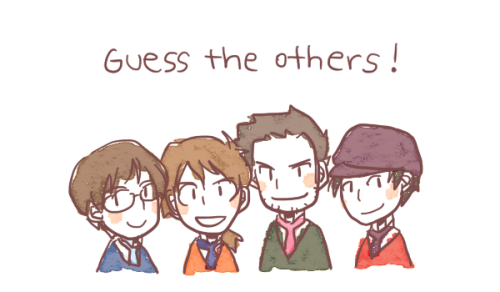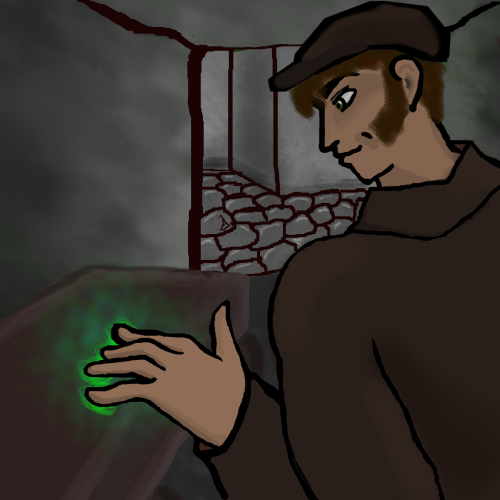[warning for death, illness, and any sort of potentially upsetting things related to poverty.]
2921 words.
—-
Feuilly owns exactly one piece of jewelry - a plain silver locket, empty, worn and dirtied by time. As far as he knows, the locket is the only thing he has left of his parents; Father Thibault, at the orphanage, told him so, and so Feuilly kept it with him through the years, through everything, and brought it with him to Paris. It was once beautiful, perhaps, in another era completely. Perhaps it was clutched in the hand of a mother, passed to the pocket of her son’s uniform when he marched off to fight a war. Perhaps it was lost, then, trampled in the mud, its former beauty spoiled by the blood of the innocents that was spilled on it. Then it would have been found, cleaned, and sold in the city market. And - and that is the part that grabs at Feuilly’s heart, sometimes, when he look at the tarnished silver locket - perhaps his father had walked by, and had stopped when he eyes caught its shine - and bought it to give to the woman who would have become Feuilly’s mother.
Feuilly doesn’t think of himself as an especially sentimental person; he cannot afford to be. Still, he does take pride in his imagination. He keeps the locket in a box in his room, by his bookshelf.
He hasn’t dared it touch it since the visions began.
—-
i.
She is beautiful; lively, kind, young - and she loves him.
Him!
She is all he can think about when he wakes in the morning - or at night, really, for is it day or night if the sun has not risen yet but he must leave the relative warmth of his bed to start a hard day of work?
But the though of her small hand in his eases the bleakness of his life and he waits, patiently, until the moment he will see her loveliness again.
—-
It starts innocently enough - at first Feuilly thinks he must have fallen asleep and entered a dream because all of a sudden he isn’t in his room anymore; he is in a house, a warm, happy home, light flooding through the windows, dust moths floating in the hair, illuminated by the warm glow of the setting sun - wasn’t it morning just a few moments ago? - and Feuilly is unable to move or speak for a moment as feels an intense, pure wave of joy - joy fulfilment love - wash over him - that is gone as suddenly as it came, and when Feuilly blinks again he is back in his own small, dark room.
The porcelain mug he had been holding is lying, shattered, at his feet.
The vision stays with him for a long time. He spends the rest of the week with a painful headache lingering behind his temples, but also has work to distract him, though the warm weather and bright June sun mean the days are longer, more exhausting. He had never minded before, but the lack of windows in his rooms now makes him feel vaguely melancholic, as if he is missing something.
He shrugs the feeling off and goes back to work; after all, that is the only thing he can do.
—-
ii.
He is not good enough for her; that, he has told her plenty, but she laughs every time, pretty and bell-like, and reminds him that she, too, is wearing garments made from cheap fabrics, and her fingers are as callused as his from her sewing and needle work.
He takes her hand, then, and kisses every scar on her knuckles, every crease on her palm, and she promises to marry him, whether or not he has a ring for her.
—-
It happens again four days later.
Feuilly is on his way to the Musain, where a few of his friends have convened, when an older gentleman suffering from a heavy limp drops a snuffbox a few steps in front of him. Feuilly reaches to grab it, intending on returning it to its owner -
- but he is immediately hit by a wave of nausea, the smell of blood and rot filling his nostrils. He can’t see much - except smoke, smoke and dirt and boots trampling the yellow grass. There is a sharp pain in his left leg; someone yells in his ear and he stumbles, suddenly back in the street of Paris.
He leans against a wall, panting, and he looks up; a few passer-bys throw him odd glances - probably thinking he is a drunk, or otherwise. The gentleman is nowhere in sight, the snuffbox still in his painfully tight grip.
Feuilly drops it as if it is burning a hole in his hand.
He has to sit against the wall fighting the urge to be sick for nearly ten minutes before his legs stop shaking - the left one doesn’t stop, not completely. He is still pale when he reaches the Musain and he leaves early, fully intending his own dreams to drown the distant sound of gun shots.
—-
iii.
The wedding is held in the summer - it is barely a ceremony, attended by very few friends; he does not have any family left, and she only has her elderly father, more than half-blind, dozing on a chair besides her. She looks splendid, as he expected her to, in the new dress she has made since he met her - a brown dress, with delicate flowers on the sleeves and skirt. She has worked on it for weeks, she explains shyly when he compliments her, and the exhaustion of these sleepless nights was worth the joy of this day. At her neck shines the bright silver locket his mother had received on her own wedding day, decades ago; the only present he can afford to give her.
If he thinks at all about the future as he kisses her, it is only of the house they will buy in the countryside in which they will raise their children once he has saved enough from his work at the factory to afford moving out of the city. She is nineteen; he, not yet twenty-four. They love each other; they still have time.
—-
Feuilly had not expected Prouvaire to follow him out of the café.
“Feuilly?” the younger man calls. “Are you alright?”
Feuilly curses under his breath and turns; his head is still spinning.
“Hello,” he replies, trying to sound nonchalant.
Prouvaire approches and even in the semi darkness Feuilly can see the concern on his expressive features.
“You look pale, my friend,” Prouvaire holds out his hand; Feully doesn’t move.
“I’m alright, there’s no need to worry. I just need some rest - I promise.”
“I saw you earlier today,” Prouvaire confesses, looking down at his feet. “On the street. I wanted to reach out to you, but there were too many - I did not want you to be embarrassed. For a moment I thought you had -” he shakes his head and blushes, as if he is about to say something he knows he should not. “But it is not like you, I know, to drink so much in the middle of the day. I am worried. You look unwell - I cannot convince you to see a doctor other than our friends, but perhaps we can at least go see Combeferre?”
Oh.
“I am not - embarrassed, exactly,” Feuilly says, looking away from the obvious concern in Prouvaire’s eyes. “And I was not drinking, no. I’m only tired I - I don’t know what came over me. There is no need to distract Combeferre from his studies. I only wish to sleep, now.”
He has not had any disturbing dreams when he is asleep, not yet - and as long as he does not understand what is happening to him, it seems to be the safest option.
Prouvaire’s piercing gaze, however, does not let go of him. It’s heavy yet gentle, warm and protective, and Feuilly flinches at the reality of Prouvaire’s hand on his arm, expecting to suddenly be taken somewhere else, to lose his grip on the familiar location of the backstreet behind the Musain, of his friend’s presence - none of that happen, but he feels his stubbornness dissolve. He explains, quietly, the headaches, the visions - or dreams, whatever they are - , the fear and the pain, and lets the younger student walk him to the main street.
—-
iv.
She is pregnant less than a year later; her belly swells as the winter winds blow down the streets and through the cheap walls of their rented lodgings. Her father dies in February; she falls ill and nearly loses the child in March, and her husband spends over a month of wages to bring a doctor to her. She and the child are both saved, but she is warned not to attempt to work until the child is born. That might not be until May or June, and her husband has to sacrifice his meagre savings to keep the three of them fed and warm through the following months. We will make it though this, he whispers to her at night, his voice already rough from the smoke he spends eighteen hours a day breathing in. He rubs her stomach, thinking of their unborn child - their family. Together, we will make it. I promise.
—-
“This is fascinating,” Combeferre says, stroking his chin, barely-contained excitement in his voice. He is eager to understand - Feuilly cannot blame him, though he isn’t so sure about the qualifying word he has used - although Combeferre seems to think everything is fascinating, but Feuilly has never thought that he, of all people, could be described as such.
He squirms on his seat, uncomfortable. Prouvaire is sitting on Combeferre’s couch, his long fingers tangled in the comforter, but his eyes are trained on them like a bird’s.
And Feuilly feels a little like a mouse, trapped and vulnerable.
“I thought - you don’t think I’m going mad?” he asks Combeferre, willing his voice to be more relaxed than he truly feels.
Combeferre shakes his head and pushes his spectacles up his nose with his middle finger; it’s an habitual gesture, familiar and beloved, and somehow Feuilly feels a little more at ease.
“There are people who dream of the future,” Combeferre says, a thoughtful look on his face. “Others can communicate without speaking, or possess a memory ten times as powerful as anyone else,” Prouvaire shifts on the couch and looks out the window. “Although you would be the first one I encounter, it is not surprising that some would dream of the past.”
“These are not exactly dreams, though,” Feuilly runs a hand through his hair. “It is like - I can tell I am awake. I am simply not - where I was anymore.”
Or who I was, he leaves unsaid.
Combeferre frowns, and a wrinkle creases slightly between his thick brows.
“Do you know what triggered it?”
Feuilly stays silent for a moment, digging through his memory for anything at all about the last twenty four hours that might be a clue.
“The snuff box,” Prouvaire supplies. “You had grabbed a snuff box that had fallen from a gentleman’s pocket. With the intention of returning it, I am sure,” he adds, smiling at Feuilly’s embarrassed blush. “But that is when you seemed to…” he waves a hand in front of his eyes. “You seemed to freeze, then you stumbled and fell against the wall. You dropped the box and immediately seemed to wake.”
“It lasted only a few seconds, then,” Feuilly nodded, mostly to himself, but Combeferre’s dark eyes turn to him, his frown deepening.
“Are you hurt?” he asks, voice no longer curious and interested, but concerned and sharp. “You have been rubbing your left leg since Prouvaire brought up the snuffbox.”
Feuilly’s face pales and his fingers unconsciously clench at the fabric of his trousers.
“I - am not hurt, I don’t think,” he hesitates.
“The old man who dropped the snuffbox was favouring his leg - the left,” Prouvaire adds quietly. “In fact, I am not certain he did not wear an artificial limb.”
Combeferre’s eyes widen behind his spectacles.
“I am alright!” Feuilly quickly reassures him. “I did feel pain, however, terrible pain - but it was gone as quickly as it had started.
"All of this from simply grabbing the snuffbox?”
Feuilly and Prouvaire both nod.
“This is indeed fascinating,” Combeferre repeats, then flushes slightly. “Of course, I mean I am sorry that you had to endure this, but - it truly is the first time I have heard of such an interesting… ability…”
Feuilly is not sure he would call it an ability under any circumstances; it has happened twice in less than a week and it was certainly too real to be an accident or, God forbid, a daydream, but he still only has a vague idea of what triggers it - and even less how to control it.
Combeferre has turned away from his guests and is rummaging through a trunk.
“You do not have these visions every time you touch an object, do you?” he mutters, head still bowed in the trunk, and Feuilly has to strain to hear correctly. “Your clothes, or this chair - you have not reacted to these, and you must have touched other items on you way here - the omnibus, for example.”
“Yes, still - I was thinking of starting the habit of wearing leather gloves,” Feuilly says lightly. Prouvaire smiles, and presses his arm. “Perhaps it would be helpful, although Courfeyrac might mock me.”
“Yes, he probably would,” Combeferre grins, walking back towards them with a few objects in his hands - a book, an old candlestick, a hat, a sheet of paper. “But before that, if I may ask - would you satisfy my curiosity - and yours, I think - by testing these?”
—-
v.
She gives birth to a little boy in the last week of May; it is a hard, harrowing, bloody night, and in the end she is left weak and unable to go back to work, her body ravaged. The doctor warns her she is not to attempt to bear children again or she will likely not survive the pregnancy. She cries, oh, she cries, for days and nights, finding comfort only in feeding her son. Her husband, clutching desperately to his dreams of a house and a family, takes on other jobs after his day at the factory. He moves crates and merchandise at the docks, and comes home too late to see his wife and son awake at all.
The locket he had given her on their wedding day stays on the small table by their bed, forgotten.
—-
The book does nothing, to the disappointment of everyone in the room; neither does the hat, to Feuilly’s frank relief, nor the paper. The candlestick, however, brings the sweet smell of fresh apples and warm bread, the fragrant autumn breeze in the south of France, and the sight of a tall, soft-spoken woman who looks so familiar, with her dark skin and intelligent gaze. When he comes to, Feuilly looks into Combeferre’s eyes and understands.
“The candlestick belonged to my grandmother,” Combeferre explains and Feuilly describes the vision, and though his eyes are teary, there is a gentle smile on his lips. “She used to invited my siblings and cousins and I for dinner every week - when she passed, each of us took a bit of her home with us - I chose this candlestick.”
Feuilly wants to say something, but does not know what: he feels like an intruder, having witnessed this short moment, this powerful love he has never known for himself.
But Combeferre smiles, clasps his shoulder, and says, still smiling, “Thank you.”
—-
vi.
He leaves a month before their son’s third birthday.
He rises before the sun, as he has seemingly all of his life; his wife is still sleeping. He dresses, kisses her forehead, and walks through the door, taking the direction of the docks.
It’s a week before they find his body floating face down on the Seine, miles from the dock he had been working on when he fell; nobody is arrested, or even fired. He is simply replaced by another young man, also a father with two young daughters to feed and no one thinks much of him again.
Accidents happen, after all.
—-
It is Prouvaire who suggests that the emotional weight that has been given to an object is the trigger to Feuilly’s strange visions of the past. His theory is sound: Feuilly remembers the porcelain mug that had triggered his first vision; he does not know who had owned the mug before him, but he thinks, now, that perhaps it had been part of a set given to a bride on her wedding day, perhaps.
Combeferre nods, satisfied with the explanation for now. He hands Feuilly a pair of leather gloves; “Until we figure out a way to control it,” he says, and Feuilly accepts them gratefully.
The following weeks his own curiosity swells and swells until he cannot contain it anymore; alone in his room he takes off the gloves and concentrate on books, maps, utensils - some objects bring a glimpse of someone else’s life; family, joy, warmth, passion, sometimes mourning or pain, but mostly mundane emotions. Some objects give him nothing, and he breathes, both relieved and surprisingly disappointed.
He does not dare touch the silver locket, not yet. Perhaps it was owned by his mother; perhaps he would see a glimpse of her life, then, maybe a happier time.
But perhaps it wasn’t, perhaps it is just a cheap trinket the orphanage gave a curious child pestering them for answers about his own origin.
He is not sure if he wants to know.
vii.
She cries when she is awake, now, and sleeps the rest of the day away. Her son cries, too - there is no food left. She glances, blearily, at the silver locket left on the bedside table. She will sell it next week, she decides. Up until now, she had not had the heart to; but today has nothing else left to sell, and her son is hungry.
One morning, three weeks after her husband has died, she finally rises from her bed; her son is still thankfully asleep. She looks at the locket, then back at her son. He is small for a three year old - has it already been three years? - but she hopes he will survive longer than she did. She kisses his forehead, like her husband had done, and walks through the door one last time, leaving both the boy and the locket behind.


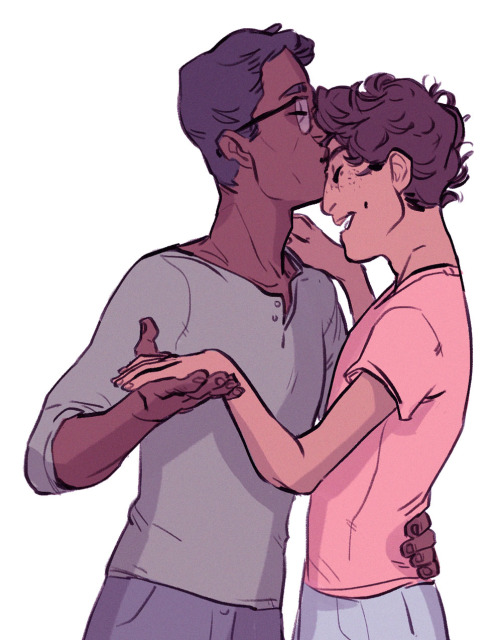
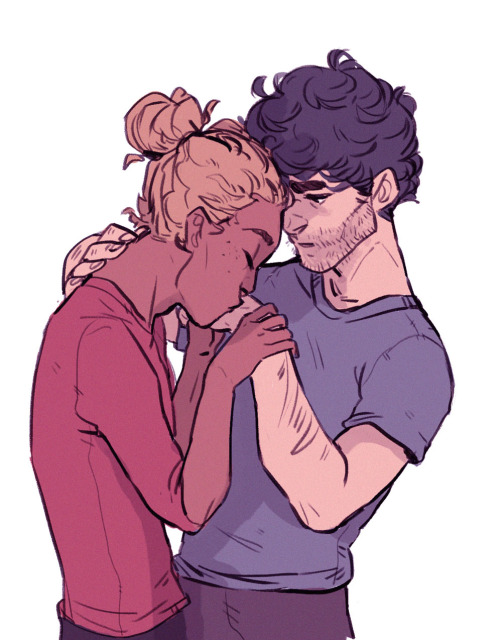
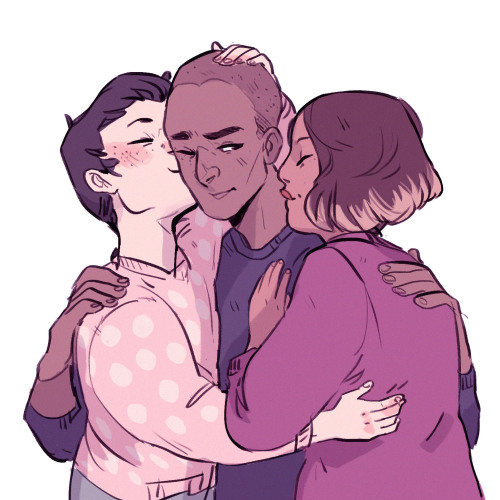



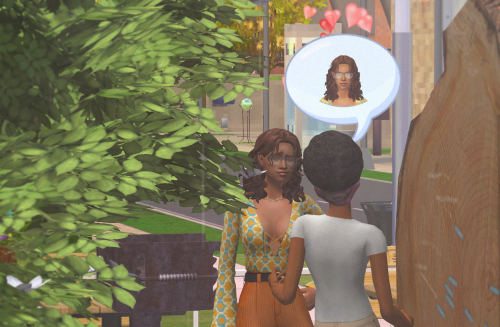










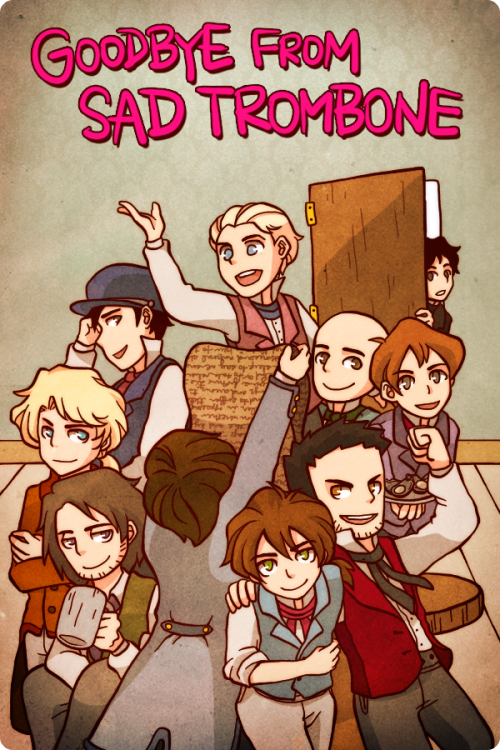

![Do you recall our innumerable joys? [full-size] Do you recall our innumerable joys? [full-size]](https://64.media.tumblr.com/3178069789fb000801d9f9dc2f664a95/tumblr_mlin9yUN6s1rl3530o2_r5_500.gif)
![Do you recall our innumerable joys? [full-size] Do you recall our innumerable joys? [full-size]](https://64.media.tumblr.com/8f710ed34e8493280b52aade6d91d997/5c6df65dc54b39a9-2d/s500x750/edf96ec27b237a358cfe9cdf1a3e9b555fb64626.png)
